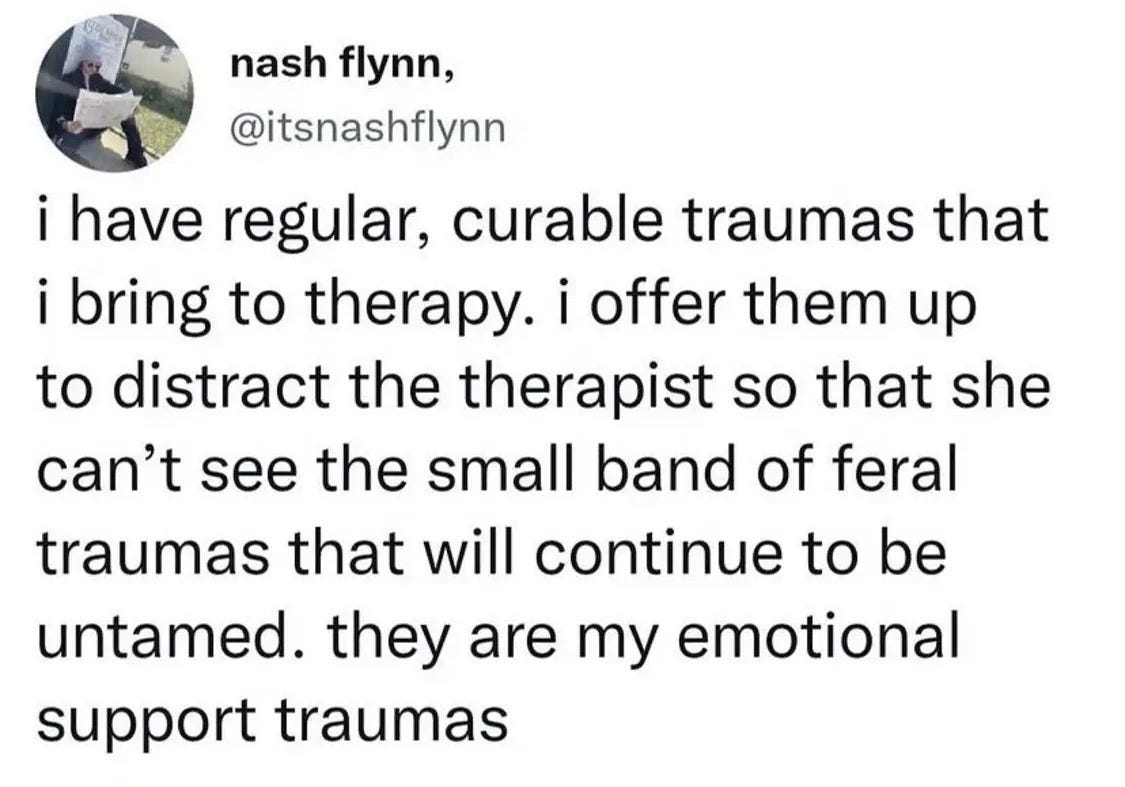Something I’ve heard from various people in my life—and yes, I’ll say it, it’s often men—is that they don’t trust therapists. Or, that they can’t imagine trusting a therapist enough to tell them their story. Or, if they get past that point and actually start seeing a therapist, that they don’t trust that therapist.
It’s pretty easy to see that attitude as counterproductive, such people as “resistant to treatment,” or other such assumptions. But as a dear friend pointed out to me one night, “Not trusting a therapist is actually a pretty good place to start.”
What did she mean by that?
Well, there seems to be this notion about that therapists are people whom a client can (and should!) trust implicitly, that you can say anything to them, that you will say things to them that you haven’t said to anyone, and that this bond of trust will heal you. The idea seems to be that the whole thing hinges on trust, and if it isn’t present, the work can’t happen.
It’s a nice idea, but even if it’s true, it’s not like it’s gonna happen right away. A client needs to feel safe first, and while many therapists (myself hugely included!) want more than anything for their clients to feel safe, they’re often coming in either super-vulnerable, or cagey and closed off, or so hurt that they don’t even know what feeling safe might look like.
I’ve written in this space before about the mistaken notion sometimes held by therapists that their clients should trust them, or at least their disappointment and insecurity when clients don’t. Trust is nice, sure, and trust, once it is established, definitely helps with vulnerability, openness, receptivity to change, and thereby, healing.
But expecting that clients will come into therapy with built-in trust for the therapist, as if the therapist is by their nature and training a trustworthy ally to all comers, is foolhardy at best, counterproductive at worst. And it shouldn’t be expected. It should be earned.
“Not trusting a therapist is actually a pretty good place to start.” Which is to say: if you’ve gotten to the point of seeing or even seriously considering seeing a therapist, you’re already on the right track. Which is also to say: if you’re starting out with a new therapist, whether you’ve ever been in therapy before or not, it’s totally fine—even expected!—that you won’t trust the therapist right away. The important thing is that you’re there, and open to starting the work. And after all, why should you trust them? Here, in fact, are several reasons you might not:
You just met them.
Or maybe you’ve met them a few times, for an hour at a time. You’ve probably spent more time interfacing with your local barista.
They’re a professional, which means they’re paid to listen to you.
You can tell they’re just trying to make you trust them.
Depending what kind of therapist they are, they might have a duty to report certain things you say.
You’ve not had a lot of luck with trusting people in the past.
In fact your body has learned through repeated exposure in early life that trusting someone enough to let your guard down and tell them deep truths about yourself in hope of getting their support is a surefire way to get them to instead turn around and betray you to those who can hurt you the most. (Oh wait, that’s me. Maybe it’s some of you, too.)
The point being: just as in any relationship, trust needs to develop over time. That goes double for a relationship with a professional that contains an inherent power dynamic. That goes triple if you’re a trauma survivor! How the heck is someone whose entire problem, for example, is that they can’t trust people because of how badly they were hurt in the past at a time when they were still forming the very concept of trust—how can such a person be expected to just walk into a therapist’s office and believe that this person, unlike all the other authority figures in their past, isn’t just going to harm them more?
Of course the patience this requires can be frustrating, especially for those who are looking for a quick fix to their suffering, which is understandable if you’re paying out of pocket for therapy. Dammit, you might think, I want to get this over with in six sessions, I don’t have time to build a bond.
And the thing is…you might even be right. That is to say: trust is important, sure. But “a good place to start” is good enough help. Like the similar concepts of good enough parenting, a good enough relationship, a good enough job, what’s really needed in order to move the needle on something you want to change in yourself is not necessarily a deep, intimate connection with your therapist that mirrors and repairs your broken bond with your mother. (Though that doesn’t hurt. I mean it does, but then it heals.) What’s needed is someone who will listen without judgment, ask the right questions at the right times, and make space for what you’re feeling—even if what you’re feeling in the moment is that your therapist is completely full of shit.
Because so often, that’s part of the journey, even if it’s mostly ego. I go to see a new therapist and I think, “she can’t handle me.” “He won’t understand my issues.” “I’m going to have to tell a new person everything all over again.” It hardly seems worth it, and the idea of going beyond the basics to build an entire relationship of trust with a therapist seems like a pipe dream.
But all I truly need is someone who’s willing to put aside their ego enough to hear what I have to say, respect my humanity, and make space for my emotions. Sometimes, a huge amount can be accomplished just be getting to tell my story to somebody who’s really listening. Even if I never form a deeply trusting relationship where I can get into the really deep stuff, I might still see some benefit from feeling heard, validated, witnessed.
The part where I really spill my guts? That can come later.




